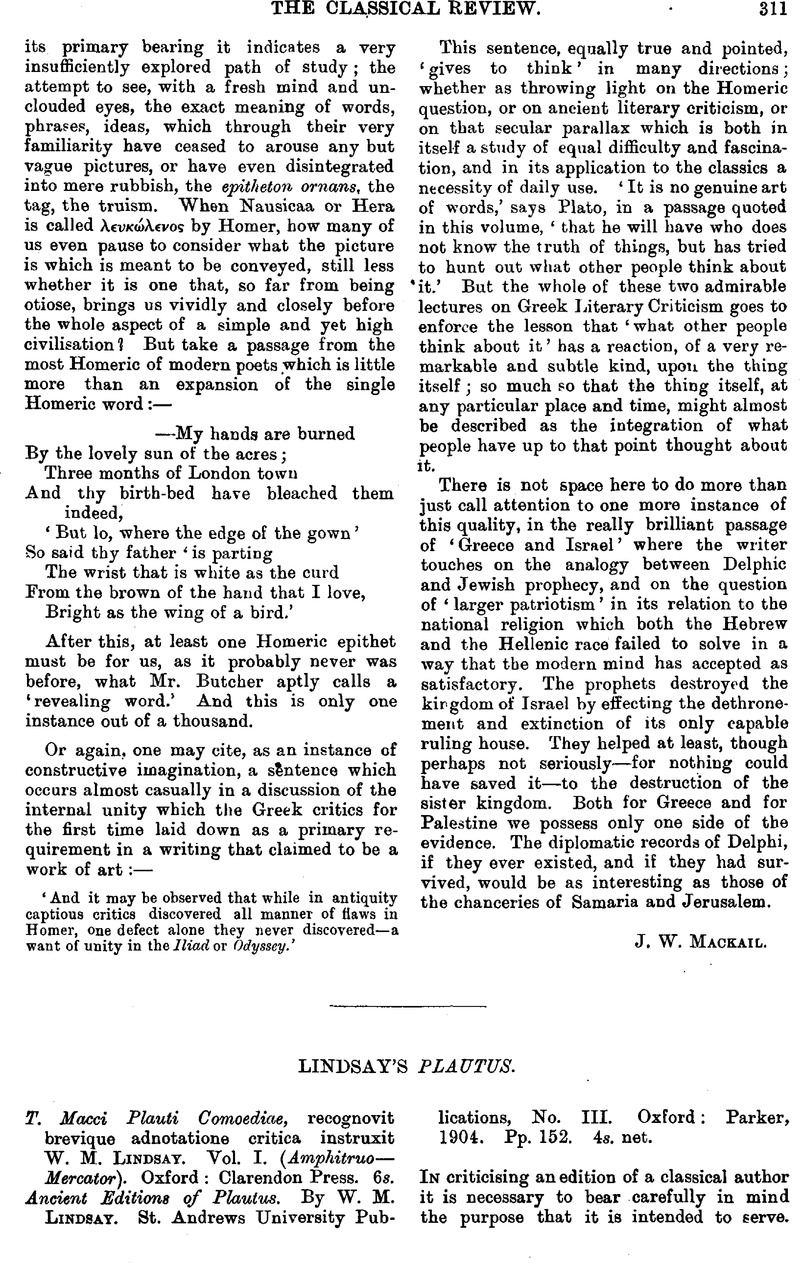No CrossRef data available.
Article contents
Lindsay's Plautus - T. Macci Plauti Comoediae, recognovit brevique adnotatione critica instruxit W. M. Lindsay. Vol. I. (Amphitruo—Mercator). Oxford: Clarendon Press. 6s. - Ancient Editions of Plautus. By W. M. Lindsay. St. Andrews University Publications, No. III. Oxford: Parker, 1904. Pp. 152. 4s. net.
Published online by Cambridge University Press: 27 October 2009
Abstract

- Type
- Reviews
- Information
- Copyright
- Copyright © The Classical Association 1905
References
page 312 note 1 Those bearing on the Rudens I was able to include in my editio minor of 1901. It is worth noting that Lindsay is now inclined to think that Lambinus had access to the codex Turnebi; see crit. note on Bacch. 736. This is very likely, as is shown by Lambinus' note on Cos. 414, where he says he used to discuss Plautine readings with Turnebus (prior to the publication of Turnebus' Adversaria, 1564–1573): one of the ‘libri veteres’ so often referred to by Lambinus may well have been the MS. known as the Cod. Turn. But as there is no reason to doubt his word when he says that he used several old MSS. (now lost, apparently), it is generally impossible to say from which of them any particular reading comes.
page 312 note 2 P. 150.
page 312 note 3 The explanation of the word ‘nearly’ is given on p. 131 (top); viz. that a few errors may have crept into some very early recension from which both A and P are ultimately derived.
page 312 note 4 Ibid. p. 112.
page 312 note 5 Ibid. p. 104 ff.
page 312 note 6 Ibid. p. III f.
page 313 note 1 In the metres of dialogue prius is always two short syllables in Plautus, except at the diaeresis and end of a verse. Hence Lindsay's reading in Cas. 378 (prΐus quám) is out of court. My emendation (prΐus est quam mihi) treats prius as = prior numerus.
page 313 note 2 Pp. 116–118.
page 314 note 1 Of the eleven conjectures (in the plays contained in the present vol.) proposed in his Introduction to Latin Textual Emendation (1896) only two find a place in the present text: Aul. 406 (Atlatae), Capt. 479 (ad pravdium deleted). Of the emendations proposed in his edition of the Captivi (1900) some are here withdrawn: e.g. Capt. 201 (ailis), 297 (sci; but scio will also not do: an imperative is required by the sense), 555 TT. for HE. There are of course a large number of new conjectures in the present text, of which a few words will be said below.
page 314 note 2 The sentiment seems appropriate, and may well have been derived from the Greek original: it is human to be in love, a thing which befalls through divine influence; to err is human, but to pardon is humane (i.e. man's prerogative): reproach me not, etc. In 319 we might read atque id uel optingit deis; for A according to Studemund has uel.
page 314 note 3 ‘Interrogative Commands,’ Classical Review, 1902, No. 3.
page 315 note 1 In Ancient Editions, p. 150, however, lie shows that he is aware of the danger.
page 315 note 2 In Cos. 814 his attribution of the second half of the line to Chalinus hardly comes uuder this category. The difficulty is that it involves dividing the line between two scenes—a thing for which there is no parallel in Plautus.
page 315 note 3 More than a year ago, I am afraid, I undertook at the request of the Editor of the Class. Rev. to review Lindsay's annotated edition of the Captivi (Methuen, 1900), after another contributor had fallen through. I fear it is too late now to remedy my neglect, which was due to unexpected pressure of work in other directions.
page 315 note 4 Praef. p. vi. Nolui aliam ac Graecis comoediis speeiem Latinis imponere.
page 315 note 5 De correptione iambiea (Lundae, 1901).
page 315 note 6 This Lindsay denies; Introd. to ed. of Capt. p. 35 f.
page 316 note 1 Appendix to ed. of Capt. p. 373.
page 316 note 2 Intr. to ed. of Capt. § 23 (p. 35), where the conditions for shortening are declared to be (1) a preceding short syllable, (2) accent on a neighbouring syllable.
page 316 note 3 Hermathena, xii. No. xxix. (1903), ‘On the relation of metrical ictus to accent and quantity in Plautine Terse’; pp. 493–495.
page 316 note 4 Note that this reading, even if it can be said to justify the short syllable (as due to the enclitic -n), produces a false stress on the next word (áetate).
page 316 note 5 This omission introduces a breach of the dipody law (Sípergés).
page 316 note 6 Iutr. to ed. of Capt. p. 34.
page 316 note 7 Ibid. p. 38.
page 316 note 8 Bacch. 934, 974, 1183, Rud. 1324. These MSS. readings are silently ignored in the crit. app. In his Captivi edition and Latin Language he says that quadrigenti is the older form; but even if this be proved, the form may be pre-Plantine.
page 316 note 9 I think there ought to have been some acknowledgment to Exon in regard to the method of indicating the quantity by the spelling; see Hermathena, xiii. No. xxx. 1904, p. 154. But, as I have said above, the right of an editor to make Latin spelling more phonetic than it actually was is disputable.




